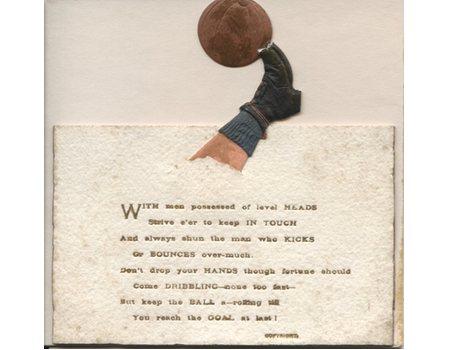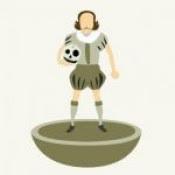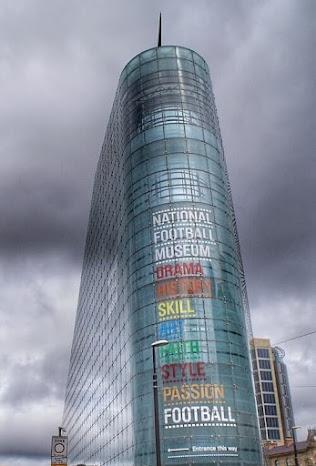
a Victorian birthday card
Robert Frost once said, ‘Poetry is play. I’d even rather have you think of it as a sport. For instance, like football.’ And not just recently. How about this from the sixteenth century:The Bewties Of The Fute-ball (anon)Brissit brawnis and brokin banis,
Stride, discord and waistie wanis.
Crukit in eild syne halt withal,
Thir are the bewties of the fute-ball I don’t immediately think of A. E. Housman as a fan but there is this from A Shropshire Lad in 1896.
XVII. Twice a week the winter thorough
Here stood I to keep the goal:
Football then was fighting sorrow
For the young man’s soul.
Actually I don’t think he was a fan.I’m probably wrong in saying that there was a bit of a break in poems about football in the UK during the middle of the twentieth century as I can only find a few.So I’m going to go straight to the year 2000 and the launch of Footballpoets. A group of poets were sitting in a cafe in Stroud, they had called themselves Stroud Football Poets and had performed football-based sets at Cheltenham literature festival and then at the Royal Festival Hall for Euro 96. With the Euro 2000 tournament approaching they decided to set up a website. They were amazed how popular it became so quickly thinking that it would just be the odd poem once a month maybe. As of today they have 17,816 poems on the site.

Subbuteo Shakespeare
They quote Wordsworth “Poetry is writing with passion about something you feel passionate about” and go on to say ‘Our slogan was and still is ‘Swapping Shirts with Shakespeare'. Love it or loathe it, just like Wordsworth says, the essence of why and how those who write football poetry do is the passion and experience we share, I guess. We/they just love it, warts and all. First and foremost, though, our ethos is simply to provide a free platform and canvas that inspires and encourage young and old to express themselves, by writing and sharing ( out loud!) about something they love.’Since then many contemporary poets have written about football. There are Poets in Residence at grounds. The last two Poet Laureates have written poems about the game.This is an excerpt from Simon Armitage’s ‘Goalkeeper with a Cigarette’:...Not my man, though, that’s not what my man does;
a man who stubs his reefers on the post
and kicks his heels in the stud-marks and butts,
lighting the next from the last, in one breath
making the save of the year with his legs,
taking back a deep drag on the goal-line
in the next; on the one hand throwing out
or snaffling the ball from a high corner,
flicking off loose ash with the other...
And here is an excerpt from one by Carol Ann Duffy:
We See You
That rain-heavy, leather ball your left foot smashed a century ago
has reached us here, and so we see you, Lily Parr,
in hindsight’s extra time...
We’re all onside...
Team-sheets are the dreams
of managers – shout out the golden days of Emma Hayes...
Women’s voices – Eni Aluko, Karen Carney – tell the poetry of play
We’ll find you – 10 years old, girl with ball, incredible to be you.
So here’s our Team Talk: We’re right behind you. And we see you.
Incidentally, one of my top ten poems ever is ‘Hop in, Dennis’ by Simon Armitage from his book ‘Seeing Stars’ but it seems that it’s carefully copyrighted or I would print it here in place of this one by me.

National Football Museum, Manchester
National Football MuseumGoing back
to that point in time
drifting past Calcio
ball games in China
flat caps on village greens
the birth of the Blues
the Reds and teams
in black and white prints
playing for love
and then for money
playing for crowds that just appeared
they never looked back
I kept going back to
1860 and twenty years
leaving the kits
the tickets and Annuals
shirts signed by players of the PFA
I kept going back
to those first few years
to Public Schools and Houses
to factory gates that opened
on Saturday afternoons
trying to find a reason
for all those winter evenings
being in the ground
twelve years old and singing
lost to smoke night and words
swept up by more than senses
not understanding what it could mean.
First published in The Journal, April ’23.
Thanks for reading, Terry Q. Email ThisBlogThis!Share to TwitterShare to Facebook
